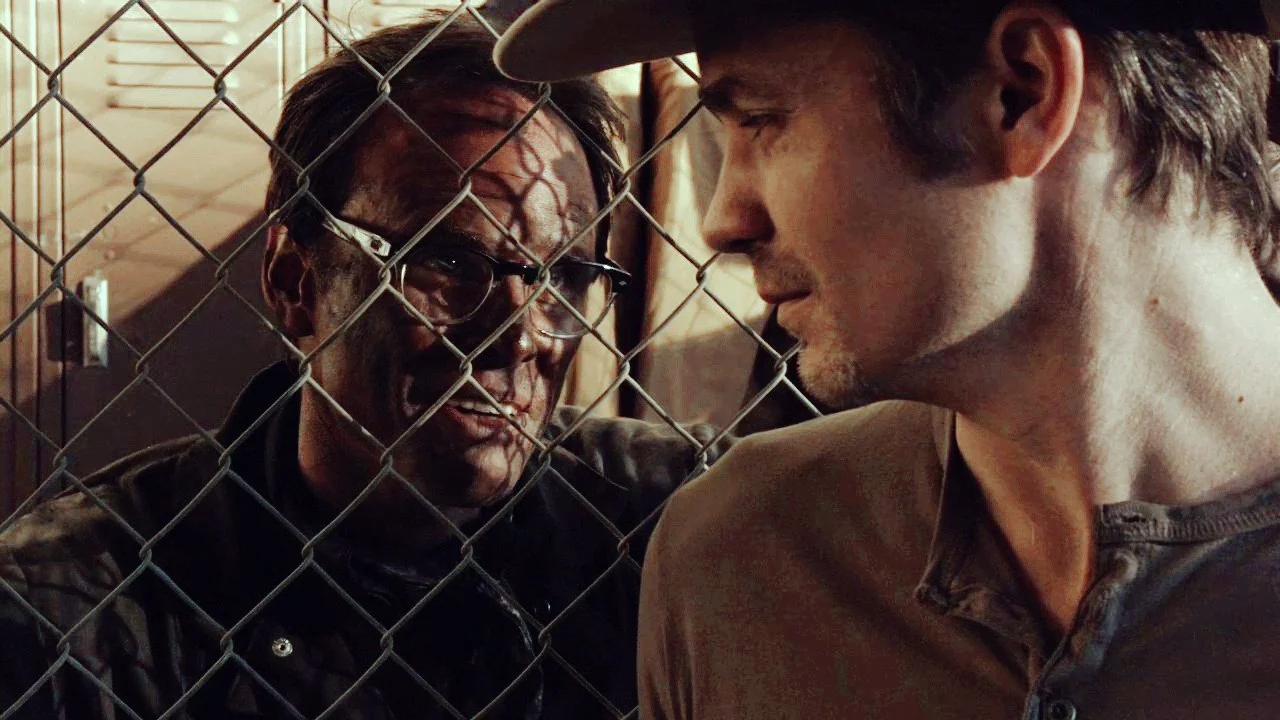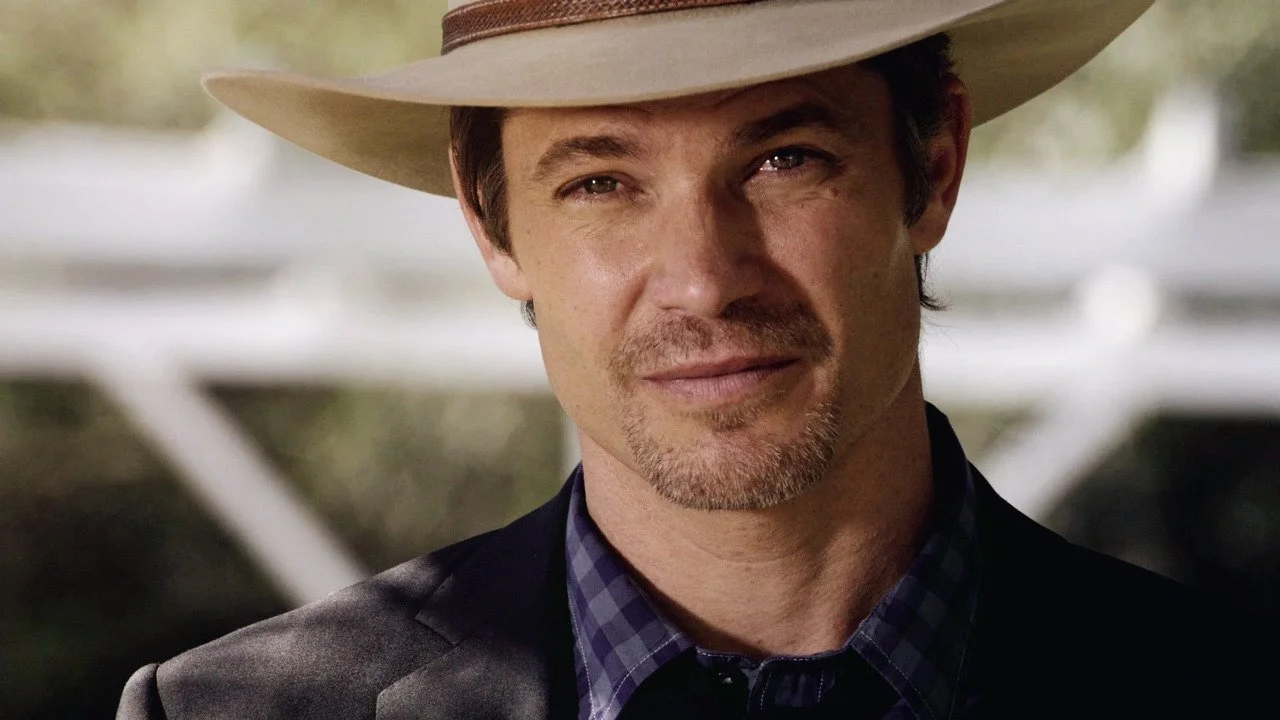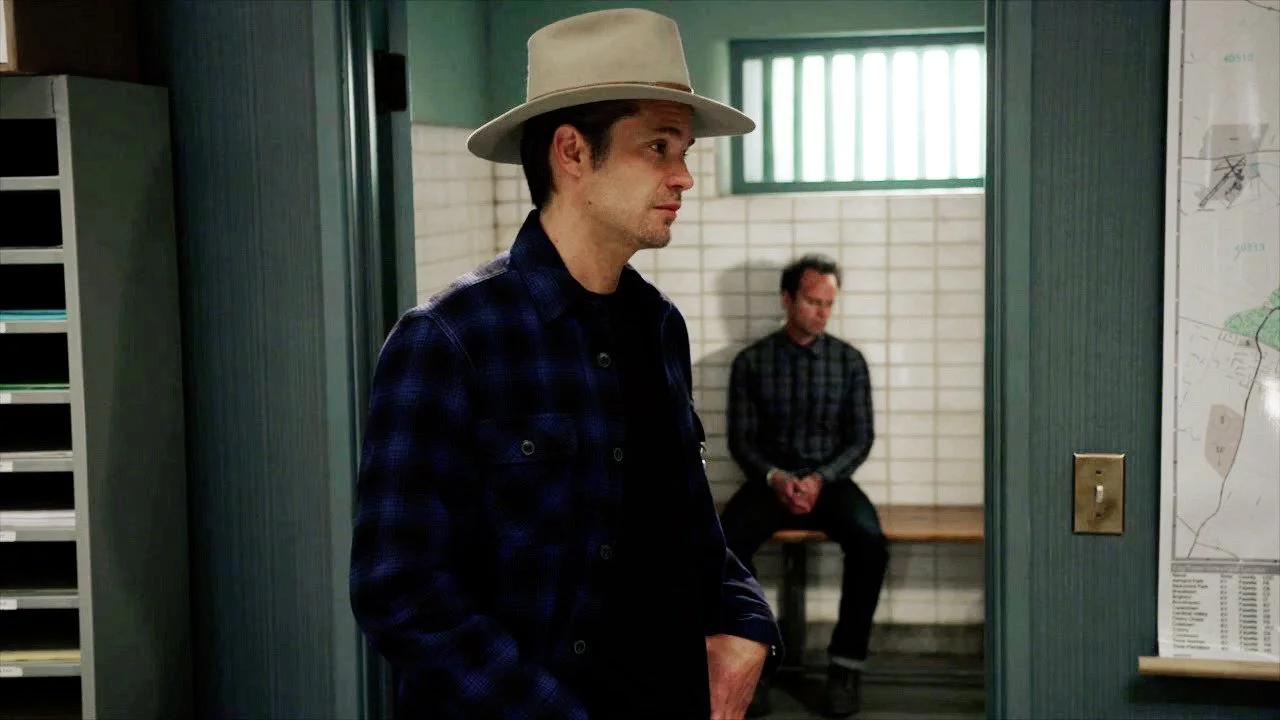JUSTIFIED at 15: Television's great Neo-western is the reason to return to Kentucky
Justified
15 Year Anniversary (of starting) & 10 Year Anniversary (of ending)
Created by Graham Yost
Based on characters created by Elmore Leonard
Starring Timothy Olyphant, Nick Searcy, Erica Tazel, Joelle Carter, Walton Loggins
by Emily Maesar, Senior TV Editor
At some point during the long and illustrious writing career of crime novelist Elmore Leonard, perhaps one of the greatest American writers of the 20th century, he met a young man named Raylan. It was at a signing, and he was so floored by the name that he straight up told him he’d name a character after him. And Leonard was true to his word when his first novel featuring Deputy U.S. Marshal Raylan Givens, titled Pronto, was published in 1993. He wasn’t the lead of the novel, but he was a secondary character, chasing after Harry Arno, a Miami-based bookie. Raylan appears again in Riding the Rap, a continuation of Harry’s story, published in 1995.
It wasn’t until around 2001, with the publication of a short story collection called Fire in the Hole, that Raylan was reintroduced. Which is perhaps the best way to describe exactly what Leonard’s approach to the character was, one that he’d put in the world almost a decade prior. Instead of chasing down Harry Arno, Raylan returns home to Kentucky and is met with illegal actions of an old friend, Boyd Crowder. While there are many elements of Raylan Givens that remain intact from his two full-length adventures, “Fire in the Hole,” as a short story, is the ultimate basis for Graham Yost’s adaptation of the character in his FX series Justified. And, historically, Leonard hadn’t been very precious about the character—he was already willing and happy to alter Raylan to fit into the different stories he wanted to tell. To the point that his final novel, Raylan, was a mix of his own creation of the character and Yost’s vision of him from the TV series.
But okay, Justified. Coming off co-writing and directing an episode of the HBO war series The Pacific, the follow up to Band of Brothers, Graham Yost started to develop what became Justified for FX. Originally titled Lawman, it was based off the short “Fire in the Hole,” with a bit of Pronto and Riding the Rap thrown in for flavor. You get Tommy Bucks and Raylan’s start in Miami, largely, but those become the driving action for him to return home and start working out of Kentucky, a place he said he’d never return to. But return he must!
Fresh of Damages, Timothy Olyphant was cast as the Raylan Givens. While his immediate previous work didn’t scream “modern cowboy in Appalachia,” his work on Deadwood from a few years prior certainly helped. However, he didn’t quite fit the idea that Yost had in his head for Raylan—which is to say that he wasn’t exactly the 50-something Raylan from the short story. But considering the changes he was making to the source material, including the ultimate change that would come later, Olyphant simply was the guy and they aged Raylan down a little bit.
And that ultimate change? That would involve Boyd Crowder, played expertly by Walton Goggins. Boyd is a perfect, natural foil to Raylan—they’d been something akin to friends in their youth, even dug coal together (we’ll get back to that), but had fallen out of touch as they became proper adults. Raylan is a cop (I do feel complicated about this, but hey) and Boyd is the ultimate confidence man. And in the short story, Boyd is dead by the end. And that was true in the original pilot, as well. Boyd Crowder was meant to be a jumping off point for the adventures of Raylan Givens, not his main antagonist. However, Goggins is a powerhouse and his chemistry with Olyphant was unmatched. So, Yost and company just, “decided to keep him alive,” at the end of the pilot. Well, at the start of the second episode.
However, while Goggins and Olyphant had been friends before the show, which is why he was approached to play Boyd to begin with, he’d actually turned the role down twice. Born in Alabama and raised in Georgia, Goggins is a Southern man through-and-through, and he was very sensitive about the way that Boyd was initially written. Which is to say that he was just kind of racist—something that was true in the short story, as well. And maybe there’s more depth there, even in Leonard’s work, but the fact is that Boyd dies at the end of both the story and the pilot that Goggins was potentially signing onto. And, as a Southern (Appalachian, even) woman, myself, I understand not wanting to add to the long list of negative stereotypes that get spouted about people from the region. And so, Goggins eventually agreed, on one condition: Boyd couldn’t actually be a neo-fascist, racist shithead.
“I’ll say the things you want me to say in the pilot, because this is Elmore Leonard’s world. But… I need Raylan Givens to acknowledge that Boyd does not believe a word he’s saying.” Yost agreed and from then on the racism we meet Boyd with is acknowledged as part of his manipulation—and after it fails to give him what he wants, Boyd abandons the ideals he never truly held. It’s something that not just makes Boyd Crowder a better character, a much more interesting character, but it elevates the entire show. Justified is, perhaps, one of the greatest, most nuanced and interesting, shows about the South and, in particular, Appalachia. Considering the series was created by a Canadian and stars a guy from California (baffling, I know, given how well Olyphant plays western-type characters with a specific kind of Southern affectation), it handles the complexity of hollers in Kentucky, and the people who live there, with care.
And for a show that was developed by someone who wasn’t Southern, let alone American, I think Yost was able to capture the hardships and unique issues of the American South in a shockingly timely way. At the time of the series airing, it dug into the real-life fight to legalize weed in Kentucky. A fight that ultimately failed, in real life, until medical weed was legalized in 2023 and went into effect at the start of 2025. Not to mention Justified joined in on the active conversation about mountaintop mining, something we talked a lot about in school (they tried to pass a bill to ban it in 2008 in my home state of North Carolina, but it was defeated). Speaking of mining…
“We dug coal together,” is perhaps the line from the six season run of Justified. It was featured as the start and ending of “Fire in the Hole.” In the series, it’s how Raylan first identifies Boyd when he hears about his actions, and it’s Boyd’s last line to Raylan in the finale. It means a lot of things, but at its core it puts the two leads of the show within this nebulous relationship that is at once both their past childhoods and their current adulthoods. It’s this way for them to be honest with each other, or an ask for it (since the final response is a lie), without all the pretense of whatever has recently happened. Raylan and Boyd as foils to each other is the strongest element of the show, a series with almost nothing but strong elements.
In particular, the relationships of their fathers to each other and then their individual relationship to their own fathers is a huge factor in the characters of Raylan and Boyd. It affects how they move in their world, what things they’re willing to tolerate, and even their own relationship from childhood. Both of their fathers were mean, violent men and they react to them differently—Raylan with abject hatred (he became a U.S. Marshal, after all) and Boyd with a desperate need to be loved. And their fathers were another thing Yost either changed or created whole cloth. Arlo Givens, alive and hateful in the show, is this shadow of a figure across Raylan’s life and you can feel it as the pilot ends. The final scene is Raylan telling his ex-wife, Winona (Natalie Zea), exactly what happened with Tommy Bucks in Miami. He says he, “never thought of himself as an angry man,” which she finds amusing in a dark kind of way. “You’re the angriest man I have ever known.” It’s something he seems shocked by, but considering things like Dickie Bennett’s leg from their youth and him running away from his abusive father at his first chance, it doesn’t seem like a huge surprise.
Bo Crowder, Boyd’s father, was able to have a different kind of hold over his son, despite being similarly horrible. Raylan wants his daddy dead, but Boyd wants his daddy to love him. It is the main driving force of the first season. And while Arlo sticks around for many seasons of the show, haunting Raylan as he tries to get a grip on his second life in Kentucky, Bo is the main villain of the first season. It is through Raylan and Boyd’s mutual respect, and love for Ava Crowder (Joelle Carter), that they are often able to see eye-to-eye, helping each other by the end of any given season. They are at once diametrically opposed, but also deeply connected.
Which is why the reboot series doesn’t work on a fundamental level. Justified: City Primeval is based on another of Leonard’s works, the 1980 novel of the same name (sans the Justified). That story stars a different U.S. Marshal named Raymond Cruz, who only makes a brief appearance in the show. And while there is a Boyd in the new show… it ain’t Boyd Crowder—love actor Boyd Holbrook as I do. Graham Yost didn’t return for the series, though it was showrun by a few people who’d been on the original show for most of its run, so that wasn’t the actual issue. The problem was twofold: there was not enough of a reason for this story to be about Raylan, specifically, and there was no Boyd Crowder. Until the end, that is. It was astounding how much Walton Goggins immediately made the show feel alive for the less than five minutes he was playing around in the story. And, in all actuality, it’s a great set up for a potential second season with Boyd.
Justified deserves to be remembered for all of its greatness—the astonishing plotting, characters, and the show’s ability to make a vibe that absolutely rocks. Also, the music is incredible. If you don’t think you like country music, particularly Appalachian Southern country music… I beg you to consider that you might be wrong! The fan playlists people have made are stuffed to the gills with amazing music! But beyond that, Justified feels exactly like reading an Elmore Leonard novel and, honestly, there’s nothing better than that. The show’s ability to be nuanced and complicated with Southern, Appalachian identity, while still making strong villains and plotlines that feel true and honest, should be studied for years to come. It’s a truly great crime show and a perfect neo-western.
Support MovieJawn Staff
–
Support MovieJawn Staff –
With the death of so much print media and meaningful journalism, it is important now more than ever to support the writers and outlets you love.
If you enjoyed this article, show your support by donating to our writer. All proceeds go directly to the writer. Recommended donation is $5.






